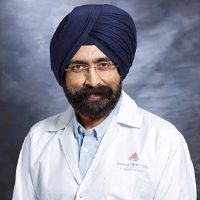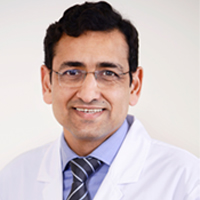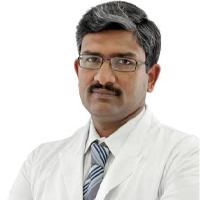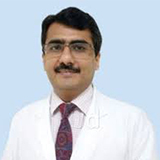Deep Brain Stimulation Surgery
Deep brain stimulation (DBS) is a complex neurosurgical procedure that aims to address irregular brain activity. The procedure involves the implantation of specialized electrodes into specific regions of the brain, which emit controlled electrical impulses. These impulses influence brain activity and help to reduce the symptoms associated with certain neurological and neuropsychiatric disorders.
Over 1,500 deep brain stimulation surgeries have been performed successfully around the world. The results of these procedures have been greatly positive, with a majority of Parkinson’s disease patients (over 85%) experiencing significant relief from stiffness, bradykinesia, and resting tremors.
Conditions treated using DBS Surgery in India
- Parkinson’s disease: DBS is very effective for people suffering from Parkinson’s disease. It targets parts of the brain responsible for motor control, which helps to reduce the disease’s tremors, rigidity, and bradykinesia (slow movement). DBS can enhance a patient’s mobility and overall quality of life by regulating abnormal electrical activity.
- Essential Tremor: Uncontrollable shaking, particularly in the hands, is a significant symptom of this condition. DBS electrodes are surgically implanted into the thalamus, a part of the brain that controls movement. By providing accurate electrical impulses, DBS can alleviate or eliminate tremors, enabling patients to regain control over their movements.
- Dystonia: DBS is an effective treatment option for individuals with dystonia (which causes involuntary muscle contractions and abnormal postures), including those with Meige syndrome. In this treatment, electrodes are implanted in specific brain areas responsible for these abnormal movements. The electrical stimulation from the electrodes can help normalize muscle tone and alleviate the distressing symptoms associated with dystonia.
- Epilepsy: While medications are the primary treatment for epilepsy, DBS can be considered for those who do not respond well to drugs. The procedure involves implanting electrodes in the brain region responsible for seizures. By delivering controlled electrical stimulation, DBS can help reduce the frequency and severity of seizures, thereby improving the patient’s life.
- Tourette syndrome: DBS can also be used to manage the tics and associated symptoms of Tourette syndrome. The electrodes are positioned in areas that control motor and vocal functions. By regulating the neural circuits involved in these tics, DBS can lead to a significant reduction in tic frequency and severity.
- Obsessive-Compulsive Disorder (OCD): DBS is considered for individuals with severe and treatment-resistant Obsessive-Compulsive Disorder (OCD). The electrodes are typically placed in the anterior limb of the internal capsule, which is a region associated with OCD symptoms.
Need for Deep Brain Stimulation Surgery in India
DBS surgery is often sought by patients who are not able to achieve symptom control through traditional medications for conditions such as Parkinson’s disease, essential tremor, dystonia, epilepsy or OCD. The symptoms of these conditions can be severe and may interfere with a person’s ability to carry out daily activities, significantly impacting their life. Medications used to manage these conditions may cause undesirable side effects in some individuals, making DBS a preferred option. In cases like Parkinson’s disease, DBS is recommended for individuals facing fluctuations in mobility and “on-off” episodes related to medication use. DBS is considered for individuals with severe and treatment resistant Obsessive compulsive disorder (OCD). The electrodes are typically placed in the anterior limb of the internal capsule, which is a region associated with OCD symptoms.
Right Candidate for Deep Brain Stimulation Surgery in India
The need for DBS surgery comes from a desire to provide reduction and enhanced functionality to those suffering from complicated neurological and neuropsychiatric diseases that have proven difficult to control through other means.
Candidates for Deep brain stimulation surgery in India are thoroughly evaluated to ensure that the procedure is the best option for them, taking into factors such as the nature of their symptoms and response to other treatments. Additional treatments may be suggested before considering DBS surgery in cases when problems such as balance difficulties, speech impairments, cognitive disorders, or unresolved psychiatric conditions are present.
Advantages of Deep Brain Stimulation Surgery in India
Some of the advantages and benefits of Deep brain stimulation in India are:
- Customized Treatment: Deep brain stimulation (DBS) surgery can be personalized to meet the specific medical needs of each patient. By adjusting stimulation settings, doctors can tailor the treatment to optimize its efficacy while minimizing potential side effects.
- Reversible Effects: Unlike irreversible surgical procedures, DBS is a reversible treatment. In case it doesn’t work as expected or if the patient experiences intolerable side effects, the electrodes and pulse generator can be removed in a follow-up surgery. This reversibility ensures flexibility and safety for patients undergoing DBS.
- Symptom Control 24/7: The DBS device can provide continuous symptom control 24/7, thereby providing relief from symptoms such as tremors or movement disorders throughout the day and night. This enhances overall quality of life and independence for patients.
- Alternative to Medications: DBS serves as a valuable alternative for patients when medications are ineffective or have undesirable side effects. It can allow for reduced medication dosages while maintaining symptom control, minimizing side effects, and improving overall well-being.
- Life-Changing Treatment: DBS can be a life-saving treatment for individuals dealing with severe neurological conditions that limit their ability to perform daily activities. It can significantly improve their quality of life, enabling them to regain the ability to engage in routine tasks and enjoy a higher level of independence.
- Hope in Challenging Cases: In certain cases, such as medication-resistant epilepsy where surgical resection is not a viable option, DBS can offer hope and a reduction in seizure frequency. This surgery can address conditions that may not have effective treatment alternatives, providing new possibilities for those facing challenging medical situations.
Risks associated with Deep Brain Stimulation Surgery in India
It’s important to note that Deep brain stimulation surgery in India can be a safe and effective treatment option, but it’s crucial to understand the possible risks and complications that come with the procedure. While these risks and complications can vary depending on the individual, there are some common ones associated with DBS surgery, such as:
- Misplacement of electrodes: Incorrect positioning of electrodes in the brain can affect the effectiveness of the treatment or lead to unintended side effects.
- Bleeding in the brain: Small holes made in the skull during the surgical process can potentially result in bleeding within the brain, leading to complications such as stroke or other neurological issues.
- Infection: Infections can occur at the surgical site or within the brain, which may require further medical interventions.
- Device malfunction: The pacemaker-like device implanted in the chest runs the risk of malfunction, such as lead wires coming loose or failure of the pulse generator.
- Neurological symptoms: During the programming and fine-tuning of the pulse generator, individuals may experience temporary side effects like numbness, tingling, memory problems, seizures, or changes in brain function.
- Hardware complications: Hardware components can erode, break, or shift, potentially requiring additional surgeries to address these issues.
- Mental and emotional changes: Mood changes, including anger, mania, or depression, may occur, which are often temporary but can affect quality of life.
- Balance and coordination issues: DBS can lead to temporary balance problems, muscle tightness, or a feeling of pulling in muscles, affecting daily activities and mobility.
- Vision and speech problems: Speech and vision issues like speech difficulties or double vision may occur as side effects during the adjustment phase of the device.
- Pain and swelling: Temporary pain and swelling at the implantation site are common immediately following surgery.
- Anesthesia risks: General anesthesia, which is administered during the procedure, carries its own set of risks, including reactions to medications and breathing difficulties.
Working of Deep Brain Stimulation Surgery in India
DBS surgery is a multi-step procedure that requires precise surgical methods and the use of specialized devices. Several key steps involved in Deep brain stimulation surgery in India include:
- Preoperative Preparation: A comprehensive evaluation is conducted by the doctor before the surgery to prepare the patient for Deep Brain Stimulation (DBS). Brain imaging (MRI or CT scans) is conducted to identify the optimal locations for electrode placement.
- Lead Implantation: Leads (thin wire electrodes) are implanted into specific areas of the brain to initiate the surgical procedure. A stereotactic head frame is attached to the patient’s skull to ensure precision and stability, and local anesthesia is used to numb the area where the lead will be inserted. The neurosurgeon makes a small incision in the scalp, drills a small hole in the skull, and inserts the lead. The patient may be asked to perform specific tasks, answer questions, or move body parts to confirm the correct lead placement.
- Microelectrode Recording (MER): Microelectrode Recording (MER) may be utilized to ensure accurate lead placement by recording neuronal activity. During MER, the patient needs to be awake to confirm the correct placement of the lead through specific tasks, answering questions, or moving body parts.
- Pulse Generator Placement: The second stage of the procedure involves the placement of the pulse generator, often referred to as the “brain pacemaker,” which is conducted under general anesthesia. An incision is made below the collarbone to implant the pulse generator, and an extension wire connects the lead from the brain to the pulse generator. The pulse generator is secured under the patient’s skin, and the incision is closed.
- Programming and Customization: A neurologist programs and customizes the DBS device to tailor treatment to the patient’s specific needs after the pulse generator is in place. Settings are fine-tuned to optimize symptom control while minimizing potential side effects. Regular follow-up appointments are essential to make necessary adjustments as the patient’s condition changes over time.
After Deep Brain Stimulation Surgery in India
Several key steps for the post operative care and recovery process include:
- Following Deep Brain Stimulation (DBS) surgery, patients typically stay in the hospital for around 24 hours (The length of the hospital stay may vary based on individual recovery progress).
- A follow-up appointment is scheduled a few weeks after surgery to initiate programming of the pulse generator.
- Pulse generators are equipped with wireless antennas for remote programming, without the need for additional surgeries.
- Pulse generators come with long-lasting batteries that can last up to nine years for rechargeable batteries or up to five years for standard batteries.
- Patients should diligently monitor their health and promptly contact their doctor if they experience any unusual symptoms, such as fever, headache, itching or hives, muscle weakness, nausea and vomiting, numbness or tingling on one side of the body, pain, redness, swelling, or irritation at any surgery sites, trouble speaking, or vision problems.
Success Rate of Deep Brain Stimulation Surgery in India
Deep Brain Stimulation (DBS) surgery has been very successful around the world, with over 1500 procedures performed in India. DBS has proven to be particularly effective in treating Parkinson’s disease, with over 95% of patients experiencing significant relief from symptoms such as rigidity, bradykinesia, and tremors. DBS is also highly effective for other neurological conditions, such as epilepsy and essential tremor. The success of DBS depends on precise electrode placement, careful patient selection, and expert post-operative care. With its impressive track record, Deep brain stimulation in India has become a viable treatment option for people suffering from severe neurological symptoms.
Deep Brain Stimulation Surgery Cost in India
The cost of Deep Brain Stimulation (DBS) surgery in India typically ranges from approximately $20,000 to $40,000 USD. However, this cost can vary depending on several factors, including the location of the hospital and the specific neurospecialist doctors involved in the procedure. DBS surgery in India is a relatively cost-effective option for patients seeking this treatment.
Best Hospitals for Deep Brain Stimulation Surgery in India
India has several well-known hospitals and medical facilities that specialize in Deep Brain Stimulation (DBS) surgery. These institutions are equipped with advanced technology, experienced doctors, and have a track record of successful DBS procedures. Patients seeking DBS surgery in India have the option to choose from a range of hospitals located in different cities across the country. When selecting a hospital for DBS surgery in India, patients should prioritize factors such as the hospital’s reputation, the expertise of the medical team, and the availability of comprehensive pre-and post-operative care.
- Artemis Hospital – Gurgaon, India
- BLK Super Speciality Hospital – New Delhi, India
- Medanta – The Medicity – Gurgaon, India
- Apollo Hospital Chennai – Chennai, India
- Max Super Specialty Hospital Saket – New Delhi, India
- Indraprastha Apollo Hospitals – New Delhi, India
- Fortis Memorial Research Institute – Gurgaon, India
- Marengo Asia Hospital – Gurgaon, India
- Sanar International Hospital – Gurgaon, India
Top Doctors for Deep Brain Stimulation Surgery in India
India is known for its highly skilled and experienced doctors who specialize in performing Deep Brain Stimulation (DBS) surgeries. These specialists are renowned for their expertise in successfully treating a wide range of neurological conditions through DBS. Patients looking for the best DBS surgeons in India can find many talented and qualified professionals across the country. It is essential to consider factors such as the doctor’s experience, patient reviews, success rates, and affiliations with reputable hospitals when choosing a doctor for DBS surgery in India.
- Sandeep Vaishya – Fortis Memorial Research Institute
- Aditya Gupta – Artemis Hospital
- Rana Patir – Fortis Memorial Research Institute
- V.S. Mehta – Paras Hospital
- Sudheer Kumar Tyagi – Max Super Specialty Hospital, Saket
- (Col.) Joy Dev Mukherji – Max Super Specialty Hospital, Saket
Contact Form
Attach Medical Report
Top Doctors & Surgeons in India
Why Choose Us

Personalized Care
24x7 Supports
Top NABH and JCI accredited Hospitals
Free Cost Estimation & Medical Opinion from Specialist
Get Free Tele/Video Consultation
Visa and Traveling Assistance
Post-surgery with Assistance in Follow-ups

